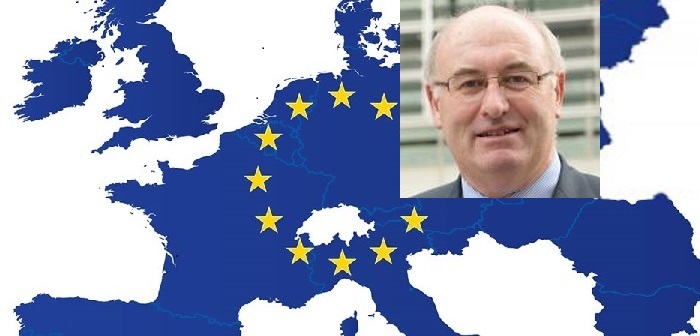The European Commission (EC) has said that it is ‘standing by’ Europe’s farmers as they grapple with the difficulties of extreme droughts with an offer of advanced development payments and greater land use flexibility.
“Farmers will be able to receive their direct and rural development payments in advance and will be granted more flexibility to use land that would normally not be used for production, in order to feed their animals,” said the EC, adding that the ongoing and prolonged drought situation in several EU countries is having a significant impact on the industry.
Commissioner for Agriculture, Phil Hogan, said: “I am very concerned about these prolonged climatic developments. I have been in contact with a number of ministers from affected countries to discuss the situation and get up-to-date assessments of its impact. The Commission, as always, is ready to support farmers affected by drought using a number of instruments, including higher advance payments, derogations from greening requirements and state aid.
“The Common Agricultural Policy already provides a safety net for farmers who have to deal with unpredictable events. I am encouraging all Member States to look into all possible actions and measures provided for in our legislation.”
Two specific decisions have been taken to help farmers deal with droughts, in addition to support under the existing Common Agricultural Policy legislation:
- Higher advanced payments: farmers will be able to receive up to 70% of their direct payment and 85% of payments under rural development already as of mid-October 2018 instead of waiting until December to improve their cash flow situation;
- Derogations from specific greening requirements, namely crop diversification and ecological focus area rules on land lying fallow, to allow such land to be used for the production of animal feed. Consideration is also being given to the adoption of further derogations to greening to allow farmers more flexibility to produce fodder. These measures will be of particular benefit to livestock farmers.
Existing support under the CAP
- Under existing agricultural state aid rules, aid of up to 80% of the damage caused by drought (or up to 90% in Areas of Natural Constraint) can be provided, subject to certain specific conditions. The purchase of fodder can qualify for aid as either material damage or income loss.
- Compensation for damage can also be granted without the need to notify the Commission (the so-called “de minimis aid”). Member States may grant aid of up to €15 000 per farmer over three years.
With regards to Rural Development, a range of possibilities is provided for in the current CAP legislation:
- Where a Member State recognises the drought situation as a ‘natural disaster’, they may provide support of up to 100% for the restoration of agricultural production potential damaged by the drought. The money can be used for investments such as the re-seeding of pastures for example. This measure can be activated retroactively;
- Farmers can notify their respective national authorities about cases of exceptional circumstances, and may be released by their Member State from their commitments under various schemes. For example, farmers will be allowed to use buffer strips for fodder;
- Member States can support farmers through risk management instruments. For example, they can financially contribute to mutual funds to pay financial compensation to affected farmers. Also, farmers who experience an income loss beyond 30% of their average annual income will receive a financial compensation.
- Member States have the possibility to modify their rural development programme once a year to include one of the measures set out above.
In addition to these measures and the continuous monitoring of the drought and its impact with European satellites, the Commission is in contact with all Member States to receive updated information of the impact of the spring and summer drought on their farmers. The information, which is requested by 31 August, will be used to assess the adequacy and appropriateness of the Commission’s response and to inform any decisions about the modification of the measures already taken or in relation to any additional measures which may be considered appropriate.
The EC announcement was immediately welcomed by NFU Scotland vice president, Martin Kennedy, who said: “In a year when all of Europe is struggling with high temperatures and drought, it is welcome that the European Commission has recognised the impact that the prolonged period of exceptionally dry weather has had.
“Today’s statement is pragmatic and will allow member states to flex greening rules so that farmers can take steps to mitigate against the worst impacts of these exceptional circumstances.”


